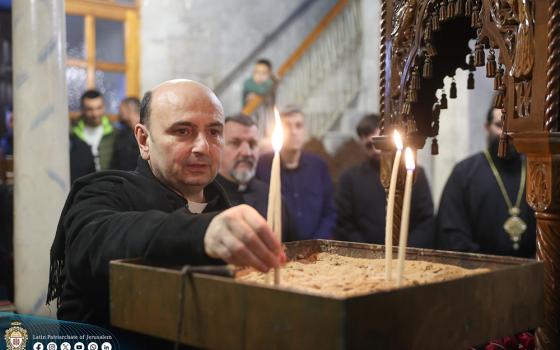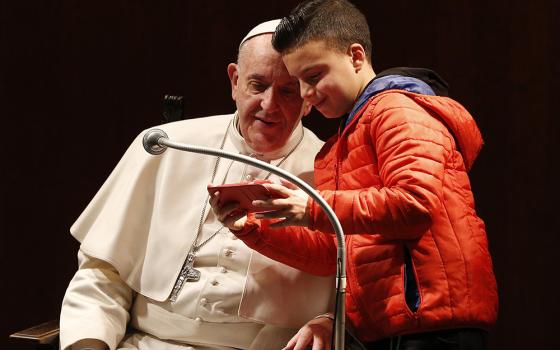
ANALYSIS
The U.S. bishops released two letters to members of Congress late last month that outline “principles and priorities that guide the public policy efforts” of the U.S. Conference of Catholic Bishops.
The first letter, signed by the newly installed conference president, Archbishop Timothy Dolan of New York, exhorts the lawmakers to protect human life from conception to natural death. “Our prayers and hopes [are] that this newly elected Congress will advance the common good and defend the life and dignity of all, especially vulnerable and poor persons whose needs are critical in this time of difficult economic and policy choices.”
The letters were dated Jan. 14 and released to the public Jan. 18.
Dolan pledges to “seek ways to work constructively with the administration and the new Congress and others of goodwill to pursue policies which respect the dignity of all human life and bring greater justice to our nation and peace to our world.”
The second letter – signed by Cardinal Daniel DiNardo of Galveston-Houston, head of the pro-life committee; Bishop Stephen E. Blaire of Stockton, Calif., chairman of the justice and human development committee; and Archbishop José H. Gomez of Los Angeles, chairman of the migration committee – dealt specifically with the issue of health care legislation.
Dolan wrote that the bishops approach public policy “not as politicians but as pastors and teachers … [of] the largest community of faith in the United States, one that serves every part of our nation and is present in almost every place on earth.”
The bishops “will work to retain essential, widely supported policies which show respect for unborn life, protect the conscience rights of health care providers and other Americans, and prevent government funding and promotion of abortion,” Dolan wrote. He asked that the Hyde Amendment, which prevents the use of federal funds for all elective abortion, be enacted as a permanent provision.
Dolan then articulated the bishops’ concern to defend traditional marriage, calling for vigorous enforcement of the Defense of Marriage Act, which limits the degree to which the federal government can recognize same-sex partnerships.
The letter next addressed a variety of concerns about social justice and the poor that range the bishops more on the political left than the political right.
It said that the bishops support economic policies that protect the poor, and call for aid to Catholic schools and continued funding for faith-based organizations that cooperate with the government in providing social services.
Dolan also addressed a novel issue: equal access to the Internet, the first time this issue has received such prominent attention from the bishops’ conference.
He called for comprehensive immigration reform, “recognizing that human dignity comes from God and does not depend on where people were born or how they came to our nation.” Among those items the bishops seek are “a path to earned citizenship, with attention to the fact that international trade and development policies influence economic opportunities in the countries from which immigrants come,” and some effort to prioritize family reunification.
Turning to international affairs, the letter calls for a “responsible” end to the wars in Iraq and Afghanistan, and voices special concern for the religious freedom of Christians and others, noting recent attacks on Christians in Egypt, Iraq and Nigeria, as well as the assassination of a Pakistani official who had spoken against that country’s blasphemy law.
Dolan also urged “continued and persistent leadership” to secure a lasting peace in the Holy Land, support for peaceful change in Sudan, and continued efforts to alleviate the sufferings of the people of Haiti.
Dolan’s letter follows the pattern set by Pope Benedict XVI in his encyclical letter Caritas in Veritate, albeit with far less explicit theological arguments. Dolan’s letter articulates a variety of concerns, all of which flow from the church’s teaching on human dignity, even though some of those concerns are shared mostly with Republicans and others mostly with Democrats.
Dolan’s letter appears to be a far cry from the position held by some conservative Catholics, such as Princeton University Professor Robert George, who argue that the church’s focus should be narrower, restricted to so-called “nonnegotiable” issues like opposition to abortion and support for traditional marriage and religious freedom.
Some might be disappointed to find that immigration comes near the very end, as if it were not a real priority for the bishops and a pressing issue for the country.
The second letter from the three bishops whose committees were most engaged in last year’s health care debate is primarily interesting because it didn’t support efforts to repeal the health care reform law.
“Throughout the last Congress the Catholic bishops of the United States affirmed our strong support for universal access to health care,” the bishops write. “Basic health care for all is a moral imperative, not yet completely achieved.”
They call for Congress to address the health care needs of immigrants, a need unaddressed in last year’s health care law.
The letter from the three bishops enumerates the bishops’ reservations concerning federal funding of abortion and conscience protections for health care workers and Catholics hospitals. They note that these last concerns can all be achieved by enacting other bills that amend the law without repealing it. One such effort, previously introduced in the last Congress, would put the original Stupak-Pitts language back in the law, codifying the Hyde Amendment by law rather than executive order, as President Obama did last year. The Stupak-Pitts Amendment failed last year when no Senate Republican promised to vote for the health care law if the amendment was attached to it.
Another prospective bill would shore up conscience protections for Catholic health care workers, a growing concern of the bishops.
No one seeking to repeal the health care law will likely find solace in this letter.
Both letters exemplify a lack of sharp elbows. The respectful tone, the lack of any demonization or mischaracterization of the views of others, the ideological balance and measured analysis, these all distinguish the bishops’ voices from so many others in the public square.
If the next three years of Dolan’s leadership follow the form and content of this letter, the church’s relationship with the political realm might be less volatile and more constructive then we’ve seen in recent years.
[Based in the nation’s capital, Michael Sean Winters writes the Distinctly Catholic blog.]




